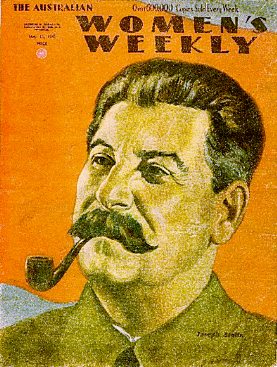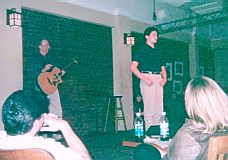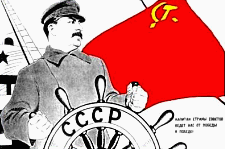
The song below has been running through my mind for several days. This darkly comedic treatment of the horror of the Stalin years comes from Al Stewart’s fine album Between the Wars:
During the future Baron’s young years he absorbed Al Stewart’s music. Already possessed of a love of history, especially the two world wars (the poetry of WWI; the aviation tactics of WWII) his almost eidetic memory allowed him to retain whatever he read or heard. He also had the gift of perfect pitch and was able to sing a capella whatever tune he’d listened to a few times. [I remember his obsession with the music to the film, “Requiem for a Dream”. During one of his college breaks, he played the first measures for me — I’m musically challenged — and asked, “what is this?” I replied, “Some kind of requiem, isn’t it?” He’d understood the mode perfectly.]
These two characteristics stood him in good stead when we attended an Al Stewart concert. [The Baron and I don’t get out much so our attendance at this show was a Big Deal]. As is often the case with this under-appreciated musician, the venue was small: a coffee house in Pennsylvania whose acoustics left something to be desired.
On impulse, I approached Mr. Stewart at the break and asked if he was going to do this song in the second set. He looked at me blankly and said, “That old thing? I don’t think I can even remember it…” His response left me disappointed. Again on impulse, I asked if my son could sing it to start the next session. When Stewart repeated that he didn’t remember it, I assured him the fB could sing it a cappella. At that point, he scoffed, asking me if I knew how many people had requested to be allowed to sing, only to go blank when they faced the audience. I assured him this would be different. OMG, I’d morphed into a stage mother in an instant!
 To my surprise, Mr. Stewart acceded to my request. [Looking back, I think he was glad to have the extra rest — he ended up leaning against the back wall of the stage during most of the song.] It was at this point I had to cajole the fB into performing. He blanched — it had been several years since he’d sung it. Then, as accommodating as ever, he retreated to a stool at the coffee bar and closed his eyes, deeply concentrating. Not having his gift for memorization, I wondered how he went about dredging up the material, but he did it, as I’d known he would — even though the process remained a mystery to me. Just as Stewart got up on stage, the fB nodded: he had it down.
To my surprise, Mr. Stewart acceded to my request. [Looking back, I think he was glad to have the extra rest — he ended up leaning against the back wall of the stage during most of the song.] It was at this point I had to cajole the fB into performing. He blanched — it had been several years since he’d sung it. Then, as accommodating as ever, he retreated to a stool at the coffee bar and closed his eyes, deeply concentrating. Not having his gift for memorization, I wondered how he went about dredging up the material, but he did it, as I’d known he would — even though the process remained a mystery to me. Just as Stewart got up on stage, the fB nodded: he had it down.
I’ll never forget that performance. The audience were die-hard Stewart fans so they remembered the song well, even if Al didn’t. By the second verse, they were stomping, Russian-dance style, in a rhythm that fit the words and tune perfectly (if anyone ever re-issues this gem, it ought to be accompanied by those mythic ‘dancers”). By the last chorus or so, Stewart chimed in with the chords.
 The resounding and sustained applause at the end of the song, plus the money people gave him, convinced the fB he’d acquitted himself well. As indeed he had.
The resounding and sustained applause at the end of the song, plus the money people gave him, convinced the fB he’d acquitted himself well. As indeed he had.
Some nice soul sent us a CD of the whole performance. The sound quality isn’t so good, but what mother would care? Since the song was haunting me I dug out the CD and played it again. I realized the fB is still a tenor but his voice is much stronger now. A few years as a tenor in an Anglican choir after college did that.
I’ll bet if I asked, he could still sing this song — and any others he’s heard more than once.
As he continues to ‘grow in wisdom and grace’, the fB remains a prodigious reader of history, moving from the theaters of war to focus on the Scots-Irish in America from their very beginnings. He believes these folk are not only the spine and sinew of America’s military but will eventually shake off the government’s heavy hand-outs and return to their old ways. For our country’s sake, may he prove to be right in his assessment.
The lyrics to “Joe the Georgian” are below the fold along with some particularly perceptive reviews of the album Between the Wars.
Joe the Georgian
by Al StewartNow I’ve got my payment for the service that I gave
They’ve given me my ticket to this place beyond the grave
I suppose it’s kind of funny, I suppose it’s kind of sad
Thinking back on all the times we hadBut it’s kind of hot and smoky in this ante-room to Hell
And I won’t make up a story ’cause you know the truth so well
It’s much too late to worry that we never had a chance
And when Joe the Georgian gets here, we will dance, dance dance
When Joe the Georgian gets here, we will danceWe all set off together on this sorry ship of state
When the captain took the fever, we were hijacked by the mate
And he steered us through the shadows upon an angry tide
And cast us one by one over the side(repeat chorus)
There’s Kamenev, Zinoviev, Bukharin and the rest
We’re sharpening our pitchforks, and we’re heating up the ends
We’ve got a few surprises for the mate when he appears
I hope he likes the next few million years(repeat chorus)
Here’s the first review
Al’s Historical Folk High Water Mark
What a pleasure to find this amazing album reissued. For years, it had been out of circulation and only available at extortionate prices.
Al Stewart is known for creating his own genre — that of historical folk. Whether or not he actually created the genre is debatable, but what’s indisputable that he does it very well. Between the Wars is not the best known of the Stewart oeuvre, however it does showcase him at his songwriting best.
To put it simply, Between the Wars marks the artistic high point of Al Stewart’s career — so far. And I do mean “so far”, as after a comparatively weak 1980’s period, Al’s last few releases have all been very strong efforts. On Between the Wars, Al found a chemistry with former Wings guitarist Laurence Juber. Acoustic sounds dominate, and the songwriting is consistently phenomenal — it’s erudite, steeped in history, and successful in evoking moods that conjure the years between WWI and WWII.
The Django Reinhardt inspired Night Train to Munich kicks off this CD, and — never mind bad — there isn’t a sub-standard song in the lot. Age of Rhythm evokes Dorothy Parker, the writers of the Algonquin Roundtable, and prohibition era speakeasies. Sampan takes us to colonial SE Asia, and Lindy Comes to Town bursts with the optimism that must have accompanied that first transatlantic flight, undoubtedly the moonshot of its day.
It would be easy to write lots about each selection on this gem of a CD, but don’t want this to become a book.
This second review is particularly evocative for me: I realized that his advice to parents was what we had done instinctively — except for Somerset Maugham, whose collection of short stories I’d lost along the way. I’ll have to rectify that omission (of course I’ll have to re-read them first myself)…
Stewart Evokes the Era
‘Between the Wars’ is a superb evocation of the time between WWI and WW2, from the world-changing landing of Lindbergh near Paris to the ominous ‘Joe the Georgian’ Stalin dance. ‘Night Train to Munich’ is a catchy black and white spy movie in song. This CD has joined my all-time favorites list. Parents should give this CD to their kids who are studying this period in school and tell them to look up how Zelda Fitzgerald, Coco Chanel, Somerset Maugham and others noted in these songs were part of the scene of life between the wars. First-rate musicianship, intelligent writing. Five stars from me!
Obviously the fB gets his memory from the Baron: the latter had to remind me that I’d written about this incident before.
When he reminded me of that post, I thought this one should be abandoned. “Why repeat our work?” I asked. But the B disagreed, especially in light of the title I’d chosen the second time around.
So much has happened between that first post and this one, just as so much happened in that frenetic period between the wars. The evocations of that period echo again in our own century for those who comprehend uneasily the déjà vu sense of current world affairs. This burden of dread for those who have studied the past and now watch the unheeding hubris of world leaders is particularly heavy this time around. Our ‘knowing’ is not about particular events. It is a foreboding born of the sad understanding that in this process repetitions take their own quirky, dangerous twists. We call these “Fate”, though we are too Western to believe in cycles. Yet all of us are too familiar with the past not to see its shadows looming over our current crises.
The desire for a Messiah or a Moses to lead us out of the Valley of the Shadow of Death appears to be stronger than ever. Even as we see the ruin and devastation rained down on the world by our current soi-disant Messiah, many of us continue to hope the next one will be different… at the very least we can be grateful that he won’t be getting any Peace Prize from the astoundingly ignorant Nobel committee.
With a deep sigh of relief we know for certain we’ll be spared further ignominy from those folks this time around.
[Coincidentally (and apropos of nothing I can put my finger on) both Al Stewart’s and Donald Trump’s mothers were born and raised in Scotland. Both mothers were beloved, though Trump was quite close to his father also. Sadly, Alastair Ian Stewart’s father was an RAF officer killed before his gifted son was born.]

NICE! Simply nice this whole GOV tonight.
THANK YOU.
An impulse vacation is nice, no? It certainly wasn’t planned…or even coordinated. I was supposed to be writing thank you notes.
I’m playing it all the day, trying to catch the rhyme with guitar.. it’s overwhelming.
the minuet form, and the cameo of typically British seaman’s epic, are rather uncharacteristic to Russian folklore (frankly fully perpendicular), – but it hypnotizes by the mix o Dantaesque elegance, the reminder of frightening simplicity of macho dead end, and the totality of Kantian climax over it.
thanks, it is unparallel piece!
oh and thanks for recent Knopfler’s song as well,
…
Well, putting it up here finally got it out of me head…
But if you want guitar, try “The Black Danube” – last track on “between the wars”:
https://www.youtube.com/watch?v=ZpGmK9vdzcA
Speaking of Stalin, have you heard Al’s song “In Red Square”? It’s been on several archive albums. It’s the original “esoteric” version of the song “The One That Got Away” (which appeared on the album “Russians & Americans”).
So you’ll notice that the music is exactly the same as “The One That Got Away,” but all the lyrics are… well, check it out.
https://www.youtube.com/watch?v=7QXxVxyjjos
I listened to it again. We don’t own this one, thank heavens for the music You Tube has made available.
I love the lyrics but for some reason his collaborations with Peter White never reach the same level as his work with Lawrence Juber.
In some interview of Stewart I heard on the radio about 20 years ago, he said that he went through a weird period of his life before his first big hit where he was (to paraphrase), “staying in my hotel room, drinking vodka, and reading about WW2 tanks all night long…”
I can think of worse fates. Just had the B buy some vodka so I can make tinctures, beginning with elderberry.